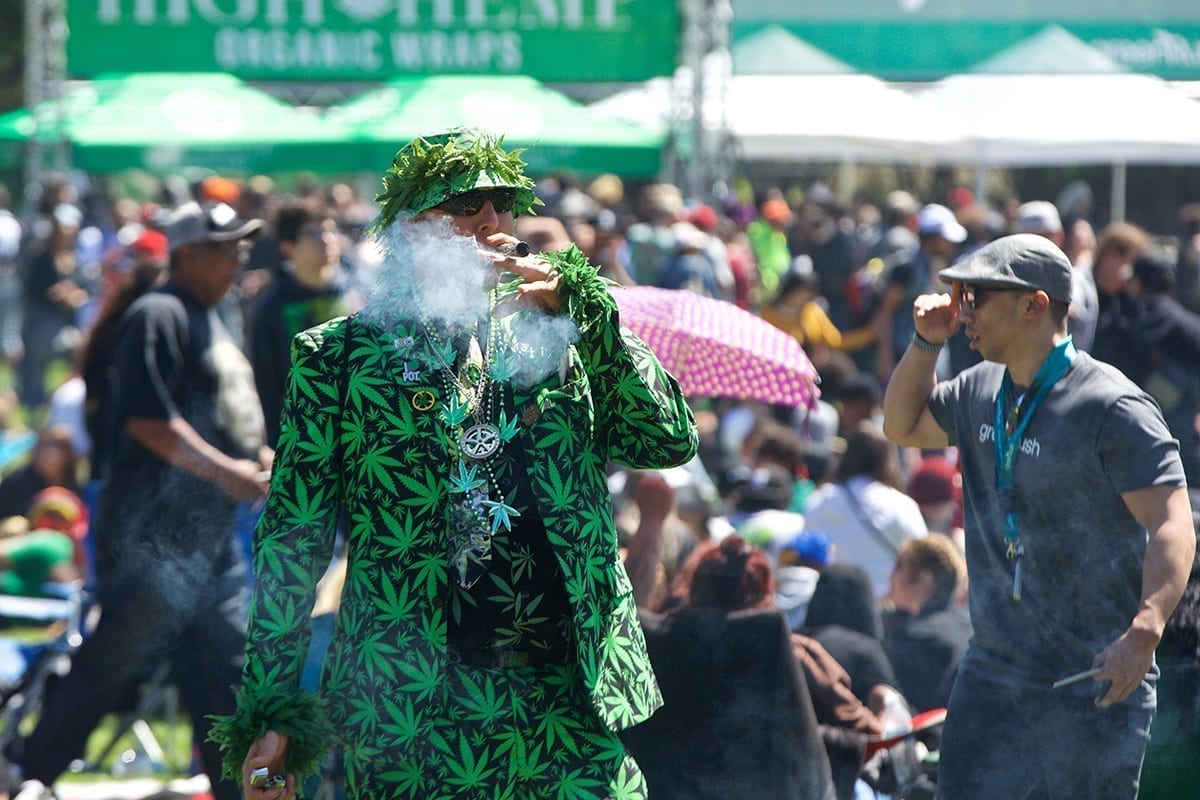Parades, concerts, festivals and other events in San Francisco could soon apply for city permits to have legal cannabis sales and consumption, under legislation introduced Tuesday by Supervisor Rafael Mandelman.
The Board of Supervisors could approve the proposal in time to allow for a permit for cannabis sales at the annual 420 event in Golden Gate Park, which in the past has gone unchecked by The City, according to Supervisor Vallie Brown, who is co-sponsoring the legislation.
Any city permission for consumption is unlikely at this event, however, since smoking is not allowed in the park.
But Brown, who represents the area where the event is held, told the San Francisco Examiner that she wants to use the permit to regulate sales to make sure the products sold are safe.
“We can’t stop it,” Brown said of the event. “The thing that we are really worried about and what happened last year is that we had people … that were selling pot with fentanyl in it. We were having people going to the hospital.”
She said that “we have to have it safe” and that the consumption aspect is something “we are not even going to mention.”
Other events may also be interested in permits, such as San Francisco Pride, How Weird Street Faire and Outside Lands.
“The city has been permitting large and small events for decades, and this ordinance will allow us to build on our existing robust event permitting framework to bring events that would otherwise feature an illegal cannabis component into a regulated space,” Mandelman said in a statement. “This will help to prevent the illegal sales and consumption of untested cannabis products, occurrences that, in the past, have put attendees’ lives in danger.”
The proposal would implement Assembly Bill 2020, which went into effect on Jan. 1 and allows cities throughout California to issue cannabis permits for temporary events. Events would need both a state license and a local license.
Initially, cannabis event permits will only go to events that have previously been held on a regular basis, have received a City-issued permit and have had significant amounts of unregulated cannabis. Those criteria could remain in place until December 31, 2021, before the permits become available to all events.
The 420 event meets these criteria, since it was city-permitted last year for such things as amplified sound and fencing.
“In the era of cannabis legalization, we need to ensure that cannabis events, like all events in San Francisco, are safe for attendees and don’t negatively impact our neighborhoods,” Brown said in a statement. She said that it would “protect the health and welfare of both event goers and our neighborhoods.”
The local permit would be issued by the Office of Cannabis director Nicole Elliott and would require approval by the city agency with oversight of the area where the event takes place, such as the Recreation and Park Department for events in public parks.
“In light of the amount of unregulated cannabis event activity occurring in our City now, I am encouraged that the Board is interested in seeing the sales and consumption of cannabis at events be regulated,” Elliott told the San Francisco Examiner in an email. “The lack of existing regulation around events is to the detriment of our common goals; decriminalization, public safety, consumer safety and preventing youth access.”
There are expected challenges associated with existing laws. Smoking isn’t allowed in public parks and state law doesn’t allow cannabis consumption where smoking is prohibited. Also, state law doesn’t allow alcohol and cannabis to be sold and consumed in the same space.
It’s also unclear how the permit conditions would be enforced when The City has a law that states: “San Francisco Law Enforcement Officers shall make law enforcement activity relating to marijuana offenses by adults their lowest law enforcement priority.”
“We’ll have to take this on a case-by-case basis. However, the OOC is interested in ensuring all relevant partner agencies participate in this decision making,” Elliott said.
Permits for events would range from a low of $500 for those with up to 500 people attending, to a high of $3,000 for events with an estimated attendance of 2,500 people or more. Fees could be waived in some circumstances, such as for an equity applicant or a nonprofit.
Read more from the source: SFExaminer.com


